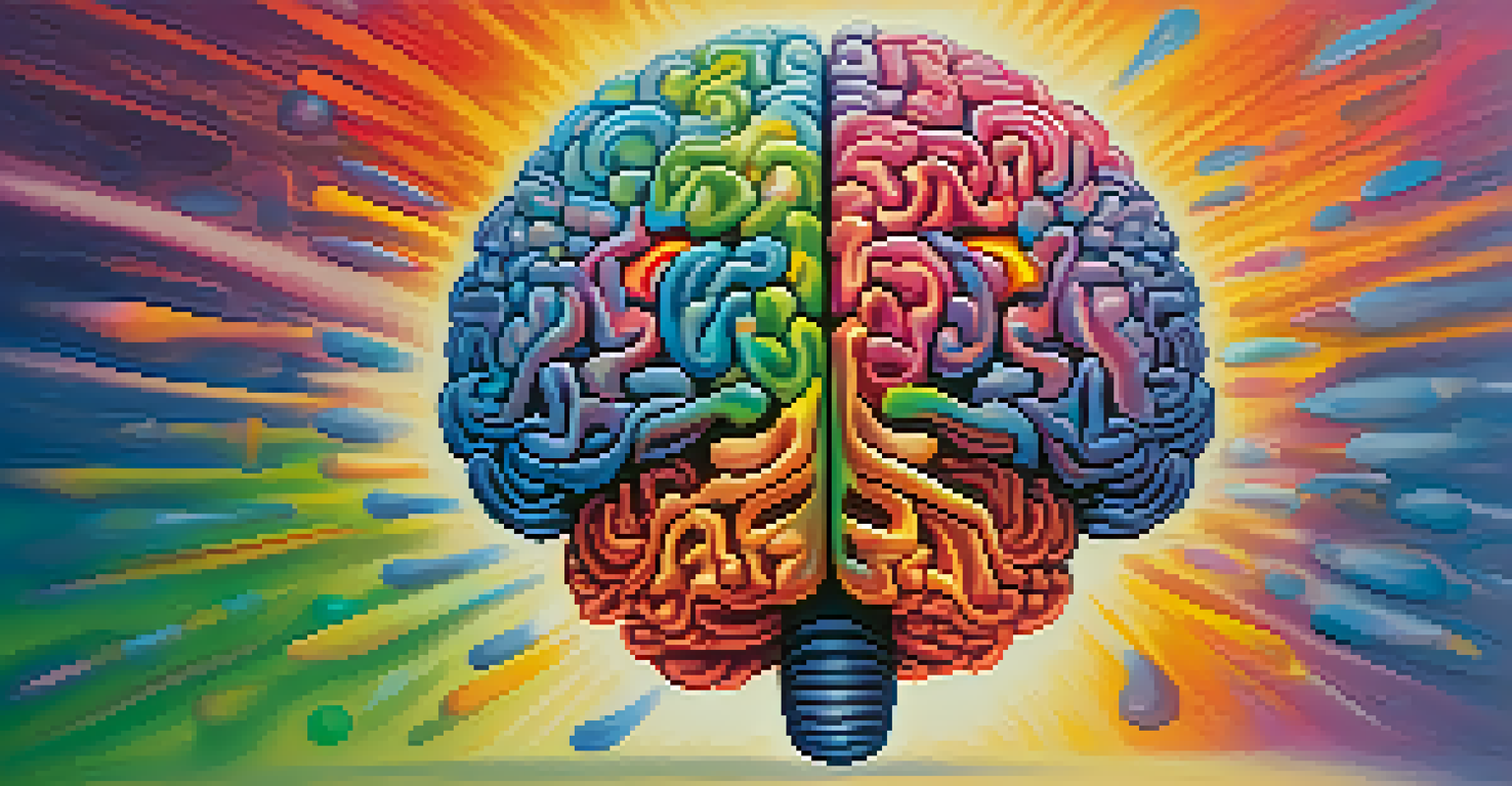Exploring Psychedelics: A Modern Overview of Hallucinogen Research

Understanding Psychedelics: A Brief Introduction
Psychedelics are substances that can alter perception, mood, and cognitive processes. Common examples include LSD, psilocybin (magic mushrooms), and DMT. Historically, these substances have been used in various cultures for spiritual and therapeutic purposes.
Psychedelics can help us break free from the constraints of our conditioned minds, allowing us to explore deeper layers of consciousness.
In recent years, there's been a resurgence in interest surrounding psychedelics, particularly in the context of mental health treatment. Studies are exploring how these substances can aid in addressing conditions like depression, PTSD, and anxiety. This growing fascination is leading to a more nuanced understanding of their potential benefits and risks.
As researchers delve deeper into the science behind psychedelics, they are uncovering how these compounds interact with the brain. This exploration is not only expanding our knowledge but also challenging long-held stigmas surrounding the use of hallucinogens.
The Science Behind Psychedelics: How They Work
Psychedelics primarily work by interacting with serotonin receptors in the brain, particularly the 5-HT2A receptor. This interaction can lead to altered states of consciousness, where users may experience visual and auditory changes. It's fascinating how these compounds can create such profound alterations in perception.

Research indicates that psychedelics can promote neural plasticity, which is the brain's ability to adapt and reorganize itself. This characteristic is crucial for healing and learning, making psychedelics a potential game-changer in mental health therapy. Imagine a brain that's more open to change and healing – that's what psychedelics may help facilitate.
Psychedelics Aid Mental Health
Research shows psychedelics like psilocybin and MDMA can significantly reduce symptoms of depression, anxiety, and PTSD.
Moreover, studies suggest that psychedelics can foster a sense of connectedness, both to oneself and to others. This feeling of unity can be therapeutic for individuals grappling with feelings of isolation or disconnection, highlighting the emotional benefits that can accompany these substances.
Psychedelics in Mental Health Treatment: Current Research
Recent clinical trials have shown promising results for psychedelics in treating various mental health disorders. For example, studies on psilocybin have demonstrated significant reductions in depression and anxiety among participants. These results are particularly noteworthy given the limited effectiveness of traditional medications for some patients.
The greatest danger of psychedelics is that they may be used irresponsibly, leading to harmful experiences, but the potential for healing is immense.
Another area of research focuses on the use of MDMA in therapy for PTSD. The combination of therapy and the psychoactive effects of MDMA has resulted in substantial improvements for those who have experienced trauma. This integrated approach showcases how psychedelics can enhance therapeutic processes.
As researchers continue to explore these treatments, they're also investigating the optimal settings and dosages for psychedelic therapy. Understanding how to create the best environment for these experiences is crucial for maximizing their therapeutic potential and ensuring safety.
The Role of Set and Setting in Psychedelic Experiences
Set and setting refer to the mindset of the individual and the environment in which the psychedelic experience occurs. These factors can significantly influence the outcome of a psychedelic journey. For instance, a calm, supportive environment can lead to positive experiences, while a chaotic setting can result in anxiety or fear.
Creating the right atmosphere is essential in therapeutic settings. Many studies emphasize the importance of having trained professionals present during sessions to provide guidance and support. This approach helps participants navigate their experiences more safely and effectively.
Set and Setting Matter
The mindset of individuals and their environment greatly influence the outcomes of psychedelic experiences, highlighting the need for proper preparation.
Additionally, the individual's mindset or 'set' plays a critical role. Those who approach the experience with openness and a positive attitude are more likely to have beneficial outcomes. This emphasizes the need for proper preparation and intention-setting before engaging with psychedelics.
Legal Landscape of Psychedelics: What's Changing?
The legal status of psychedelics varies significantly across the globe, with many countries still classifying them as illegal substances. However, recent years have seen shifts in public perception and policy, leading to decriminalization efforts in some regions. Cities like Denver and Oakland have taken steps to allow the use of psilocybin mushrooms under certain conditions.
As research continues to demonstrate the therapeutic potential of psychedelics, more advocates are calling for regulatory changes. This could pave the way for more extensive studies and clinical applications. The evolving legal landscape is a vital factor in how these substances can be integrated into mental health treatment.
While progress is being made, challenges remain. Issues such as stigma, misinformation, and regulatory hurdles must be addressed to create a safe framework for psychedelic research and therapy. Understanding these dynamics is crucial for anyone interested in the future of psychedelics.
Potential Risks and Considerations with Psychedelics
Despite their potential benefits, psychedelics are not without risks. Adverse effects can include anxiety, paranoia, and in some cases, the exacerbation of pre-existing mental health conditions. It's essential for individuals to be aware of these risks before embarking on a psychedelic journey.
Moreover, the context in which psychedelics are taken plays a significant role in their safety. Unsupervised use, especially in uncontrolled environments, can lead to negative experiences. This highlights the importance of ensuring that psychedelics are used responsibly and, preferably, under professional guidance.
Evolving Legal Landscape
As public perception shifts, various regions are beginning to decriminalize psychedelics, paving the way for further research and potential therapeutic applications.
Education and awareness are key to mitigating these risks. By providing accurate information and setting expectations, individuals can make informed decisions about their psychedelic experiences. This proactive approach can help ensure that the exploration of psychedelics is both safe and beneficial.
The Future of Psychedelic Research: What Lies Ahead?
As the stigma surrounding psychedelics continues to diminish, the future of research in this field looks promising. Scientists are eager to explore various compounds and their effects on the brain, aiming to unlock new therapeutic avenues. This surge in interest could lead to groundbreaking discoveries in mental health treatment.
Upcoming studies are likely to focus on the long-term effects of psychedelics and how they can be integrated into conventional therapies. Researchers are also exploring combinations of psychedelics with other treatments, such as therapy and medication, to maximize their efficacy. The potential for innovative approaches is exciting.

Ultimately, the goal of this research is to create safe, effective, and accessible treatments for those in need. As we continue to learn more about psychedelics and their impact on mental health, we may be on the brink of a new era in psychological care that prioritizes holistic healing.